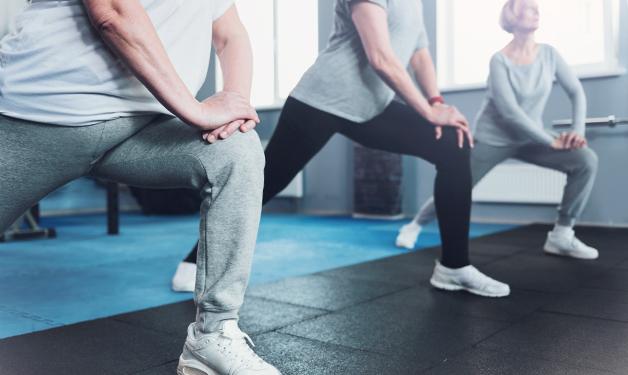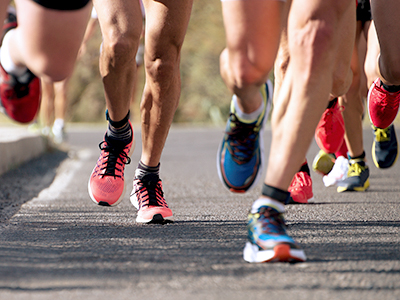
VCHRI researchers one step closer to recommendations for running and knee osteoarthritis.
A recent survey found a lot of uncertainty on the topic of running and knee joint health. The cross-Canada survey of 831 health practitioners and members of the public was conducted by Vancouver Coastal Health Research Institute scientist Dr. Michael Hunt and his colleague, Dr. Jean-Francois Esculier. Results of the survey found that many respondents were not sure whether running was good or bad for knee joint health. Hunt and Esculier say the findings underscore the need for more research and education, especially when it comes to knee osteoarthritis (KOA), the most common type of arthritis that affects 4.5 million Canadians.
“With this survey we wanted to get people’s perceptions on two main categories,” says Esculier. “Did they generally think running is bad for knee health and did they believe people with KOA would damage their cartilage if they ran?” About a third of the people surveyed were health practitioners, while the rest were runners and non-runners aged 40 and older.

The survey showed that non-runners were less positive about the benefits of running than the runners were. A more dramatic statistic, says Hunt, was that a quarter of health practitioners were not sure whether running would negatively affect KOA, compared with half of public respondents. “The difference shows a need for better communication and a lack of information available to practitioners about running and KOA.”
"We have to step up with more research on running and KOA to answer that uncertainty."

Is there a definitive answer? “Give us a few years,” jokes Hunt. Fortunately, he and Esculier are in the perfect place for this research. “We are the only research lab in the world right now that looks specifically at the effects of running on KOA.”
"We’re very fortunate to be in a location with an older but very active population—many BC residents are runners with KOA. You wouldn’t find that in many other places in the world."
Hunt and Esculier just completed a study of cartilage recovery after running. On a basic level, the running motion compresses knee cartilage and “pushes” water out. Afterwards, during recovery, the water makes its way back into the cartilage. In the study, a group of women aged 40 and older—half with KOA and half without—ran for 30 minutes. “We did an MRI before and right after the run,” says Esculier. “There was no difference in water content in the cartilage in either group. However, 60 minutes later, an MRI showed those with KOA had a bit more water.” The water indicates more fluid was moving into the cartilage after running.
Do these results mean the women with KOA should give up running?
“Absolutely not,” says Hunt. “These participants love running and do not want to give it up. What we need to look at now is how to modify their running—perhaps building in longer recovery times—so they aren’t overworking their joints.” Hunt says the study only focussed on cartilage, which is just one part of the KOA puzzle that includes bones, ligaments and muscle. Additionally, this study was only comprised of a small sample group.
“The next step is running a larger study, with men and women. We will put them in a running program and train them to increase their volume over a 12-week period. Then we’ll monitor their cartilage. This could lead to more precise recommendations for running duration and recovery time.”
Low versus high impact sport
If it is unclear whether running is safe for KOA patients, why not advise them to opt for a lower impact sport?
While joint swelling is far from ideal, the jury is still out on whether the slight increase in cartilage water content after running is a bad thing, says Esculier. Since cartilage has no blood vessels to bring in nutrients for repair, a little bit of fluid movement after compression may be a good way to stimulate cartilage. Esculier says that mechanism only happens with a load-bearing exercise such as running. “When we cycle, for example, there is less fluid movement because there is less compression to push the water out and bring it back in.”

“Whatever exercise you find enjoyable is the right exercise for you. It keeps body weight down, it keeps your bones and muscles strong and it boosts mental health. If you have a bit of soreness, you can moderate your activity, but if you are experiencing pain, then it needs to be addressed.” Hunt says in the case of runners, many will do anything to keep running. It is up to researchers to find a way to help them do so safely.
Learn more about Hunt and Esculier’s KOA studies at their research lab website.


